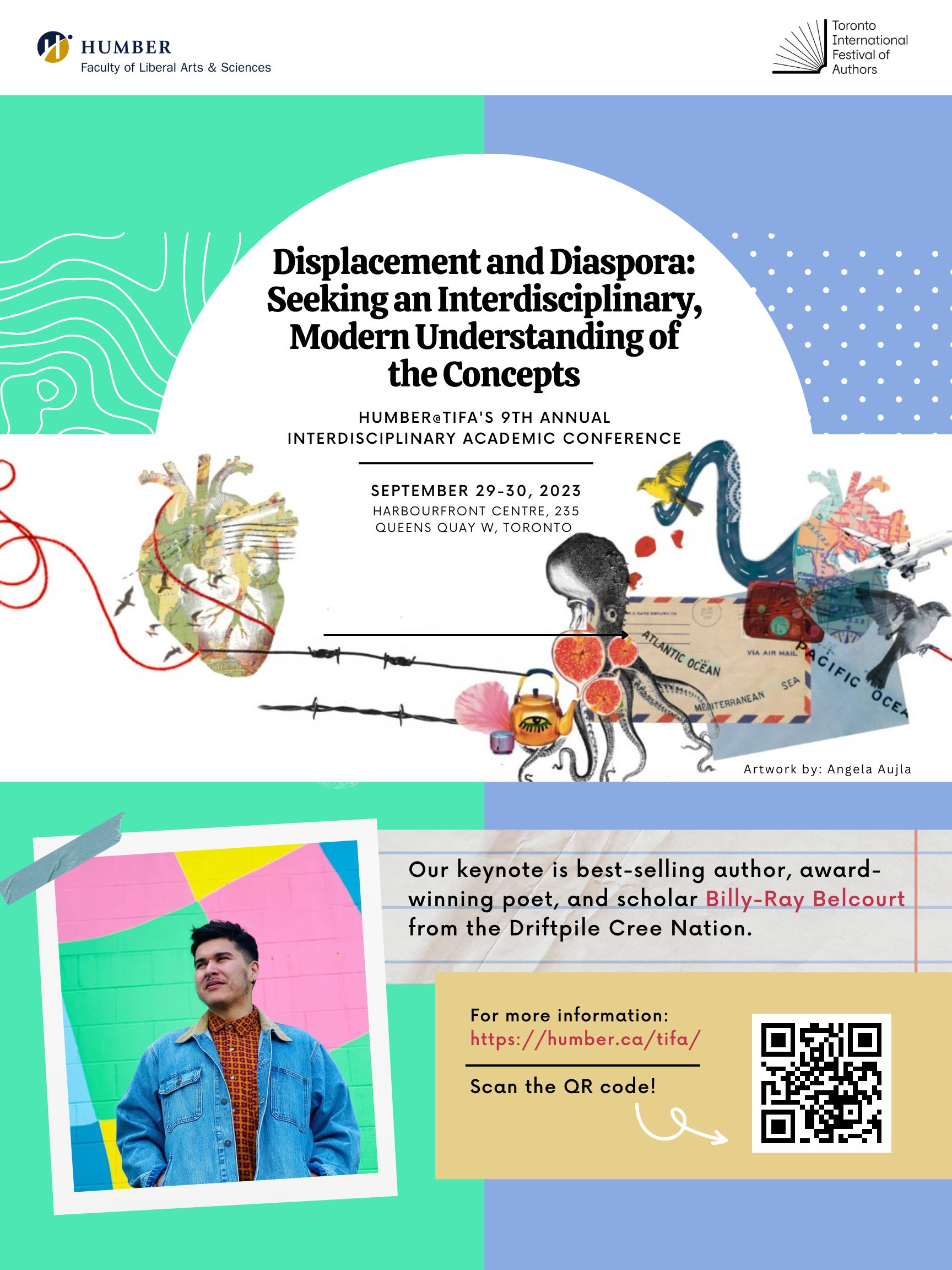Abstract submission: https://humber.ca/tifa/call-proposals
Contact: tifa@humber.ca
Submission deadline: May 28, 2023
Conference date: September 29-30
Conference fee: Waived for Humber faculty (includes registration, some meals, snacks, and a reception)
Location: The Harbourfront Centre (235 Queen’s Key West, Toronto, Ontario, Canada)
Hosts: Faculty of Liberal Arts & Sciences, Humber College, and the Toronto International Festival of Authors (TIFA)
Keynote Speaker: Billy-Ray Belcourt
Billy-Ray Belcourt is a writer and academic from the Driftpile Cree Nation. He is an Assistant Professor in the School of Creative Writing at the University of British Columbia. He is the author of four books: This Wound is a World, NDN Coping Mechanisms: Notes from the Field, A History of My Brief Body, and A Minor Chorus.
Call for Proposals:
“The formation of a diaspora could be articulated as the quintessential journey into becoming; a process marked by incessant regoupings, recreations, and reiteration. Together these stressed actions strive to open up new spaces of discursive and performative postcolonial consciousness.” - Okwui Enwezor (Nigerian poet, art historian, and curator: 1963-2019)
At COP26, the 2021 United Nations Climate Change Conference, Tuvalu’s foreign minister Simon Kofe delivered a pre-recorded address to the delegates standing behind a podium knee-deep in water to highlight the rapid effects climate change is having on his country. The island nation of Tuvalu, located in the South Pacific, is just over four metres above sea level. It’s been predicted that as soon as 30 years from now, the country will be completely submerged, leaving its population of about 11,000 without a home. They would be part of a predicted 200 million environmental refugees that could exist within the next 30 years.
When we think of displacement and diaspora, we often think of refugees displaced by war and imperialism, but our conception of these terms is growing, particularly as we face increasingly bleak environmental outlooks, but the very idea of what it means to be displaced and to be part of a diaspora is changing as well. According to UNHCR, The UN Refugee Agency, at the beginning of 2022, of the 89 million people displaced worldwide, over 53 million people were internally displaced, meaning despite being separated from their homelands, they have not crossed a border to find refuge. In settler colonial states like Canada, there is also a growing understanding of the effects of Indigenous displacement (historic and ongoing) and an increasing understanding of urban Indigenous communities as forming a diaspora as well.
This conference seeks to explore displacement and the concept of diaspora through an interdisciplinary lens. Whether due to war, colonialism, or environmental deterioration, we are seeking analyses of the causes of displacement, and we want to hear stories from and about the diaspora. Whether it be studies of diasporic literature, analyses of environmentally-influenced migration, or glimpses into what it means to be part of a digital diaspora, we are seeking to have our understanding of the terms diaspora and displacement challenged and reshaped.
Themes/Topics:
- Activism
- Alienation and displacement
- Art and film
- Belonging and Belongingness
- Citizenship
- Climate change displacement
- Communities of culture (and cultures of healing)
- Concept of home
- Crime displacement
- Cultural identity and community
- Cultural hybridity (Hybridized cultural practice)
- Diasporic cinema
- Diaspora communities
- Diasporic culture
- Diaspora curriculum
- Diaspora geopolitics
- Diaspora as social movements
- Diasporic literature(s)/Canadian literature
- Diaspora tourism
- Digital diaspora
- Food in the diaspora
- Forced displacement
- Gendered transnational selves
- Human rights
- Homeland politics
- Hostlands and homelands
- Imagined communities
- Immigration and emigration
- Imperialism
- Indigenous diaspora within settler colonial states
- Instability of national categories
- Internal displacement
- Internment
- Invisibility
- Language socialization
- Memory-making, Nostalgia and In-Betweeness
- Music and visual culture
- Public policy
- Post coloniality and the politics of location
- Psychology of displacement
- Queer diasporas
- Refugees
- Religious identity and diaspora
- Spaces of visibility and resistance
- Statelessness
- Transnational literature
- Trauma and terror
- War crimes
Our conference committee welcomes individual presentation proposals of 300 words, and panel proposals (three people max) of 900 words, based on any of the above themes. This will be the ninth annual Humber@TIFA interdisciplinary conference held by Humber College’s Faculty of Liberal Arts & Sciences in association with the Toronto International Festival of Authors (TIFA), one of the most celebrated literary festivals in the world. TIFA is located at the Harbourfront Centre, one of downtown Toronto’s major cultural and artistic venues.
Submit your proposal and a brief bio online by May 28, 2023.

